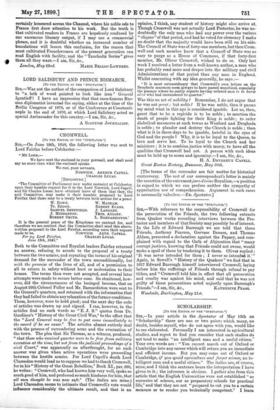CROMWELL.
[TO THE EDITOR OF THE "SPECTATOR.")
SIR,—On June 19th, 1648, the following letter was sent to Lord Fairfax before Colchester :— "My LORD,—
We have sent the enclosed to your perusall, and shall need say no more than what the enclosed speaks. We rest, your servants, NORWICH. ARTHUR CAPELL. CHARLES LUCAS. [ENCLOSURE.]
,The Committee of Parliament now under restraint at Colchester, upon their humble request for it to the Lord Norwich, Lord Capell, and Sir Charles Lucas, have obtained leave of them that they, the said Committee, may make it their humble proposall to Lord Fairfax that there may be a treaty between both armies for a peace.
W. ROWE. W. 31A5mihr.
TS. EEDON. ROBERT EVANS.
SAMUEL SHEFFIELD. J. LANGLEY.
J. MIDDLETON. Taos. AYLOFF.
ROBERT SMITH. L. BARNARDISTON: It is the general peace of the Kingdome we contend for, and therefore we are content that the Committee shall send this above- written proposall to the Lord Fairfax, according unto their request made to us. NORWICH. .511TH. CAPELL.
For my Lord Fairfax, CHARLES LUCAS. Tune 19th, 1848."
Both to the Committee and Royalist leaders Fairfax returned an answer, refusing to accede to the proposal of a treaty between the two armies, and repeating the terms of his original demand for the surrender of the town unconditionally, but with the promise of the lives of all, and of a permission to all to return in safety without hurt or molestation to their homes. The terms then were not accepted, and several later attempts were made to secure better ones. So straitened, how- ever, did the circumstances of the besieged become, that on August 26th Colonel Fuller and Mr. Barnardiston were sent to the General's quarters, and returned with the information that they had failed to obtain any relaxation of the former conditions. These, however, were to hold good; and the next day the code of articles was drawn up and signed. I can, however, in the articles find no such words as "E. J. S." quotes from Dr. Gardiner's "History of the Great Civil War," to the effect that the "Lord General may be free to put some immediately to the sword if he see cause." The articles almost entirely deal with the process of surrendering arms and the evacuation of the town. The plea that Sir Thomas, as a witness, produced, "that those who received quarter were to be free from military execution at the time, but not from the judicial proceedings of a civil Court," was apparently an afterthought, for no such answer was given when active operations were proceeding between the hostile armies. For Lord Capell's death Lord Clarendon would lead us to suppose we had to thank Cromwell, for in his "History of the Great Rebellion," Book XL, par. 260, he writes: "Cromwell, who had known him very well, spoke so much good of him, and professed so much kindness for him, that all men thought he was now safe." (The italics are mine.) Lord Clarendon seems to intimate that Cromwell's vote would influence considerably the ultimate result, and that is an opinion, I think, any student of history might also arrive at.
Though Cromwell was not actually Lord Protector, he was un- doubtedly the only man who had any power over the various "cliques "of that period, and had he voted for clemency I make no doubt that the majority would have been still on his side.
The Council of State was of forty-one members, but then Crom.
well and each member knew that a Council of State was as easy to purge as a House of Commons, if that forty-first member, Mr. Oliver Cromwell, wished to do so. Only last week I received a letter from a well-known author, a man who has probably read more and deeper into the military and civil Administrations of that period than any man in England. Whilst concurring with my idea generally, he says :— " It is most extraordinary that Cromwelrs own letters on the Drogheda massacre seem always to have passed unnoticed, especially the passage where he coolly reports having ordered men to be burnt alive who had surrendered to quarter."
Was this an act of nobility ? Remember, I do not argue that he was not great; but noble? If he was noble, then it passes my mind what in this age is considered ignoble. Let us, then, grant that to be a regicide is to be noble ; to sanction the death of people fighting for their King is noble ; to order diabolical massacres at such towns as Wexford and Drogheda is noble ; to plunder and destroy the Church is noble ; then what is it in these days to be ignoble, hateful in the eyes of God and the people ? Why, it is to be loyal to the Queen, to love and serve her. To be loyal to the Church and her ministers ; it is to combine justice with mercy, to have all the qualities that Cromwell had not. A person with such ideas must be held up to scorn and ignominy.—I am, Sir, &c., [The terms of the surrender are fair matter for historical controversy. The rest of our correspondent's letter is mainly the assertion of the extremestjure-divine Royalism,—a position in regard to which we can profess neither the sympathy of approbation nor of comprehension. Argument in such cases is necessarily valueless.—En. Spectator.]






































 Previous page
Previous page